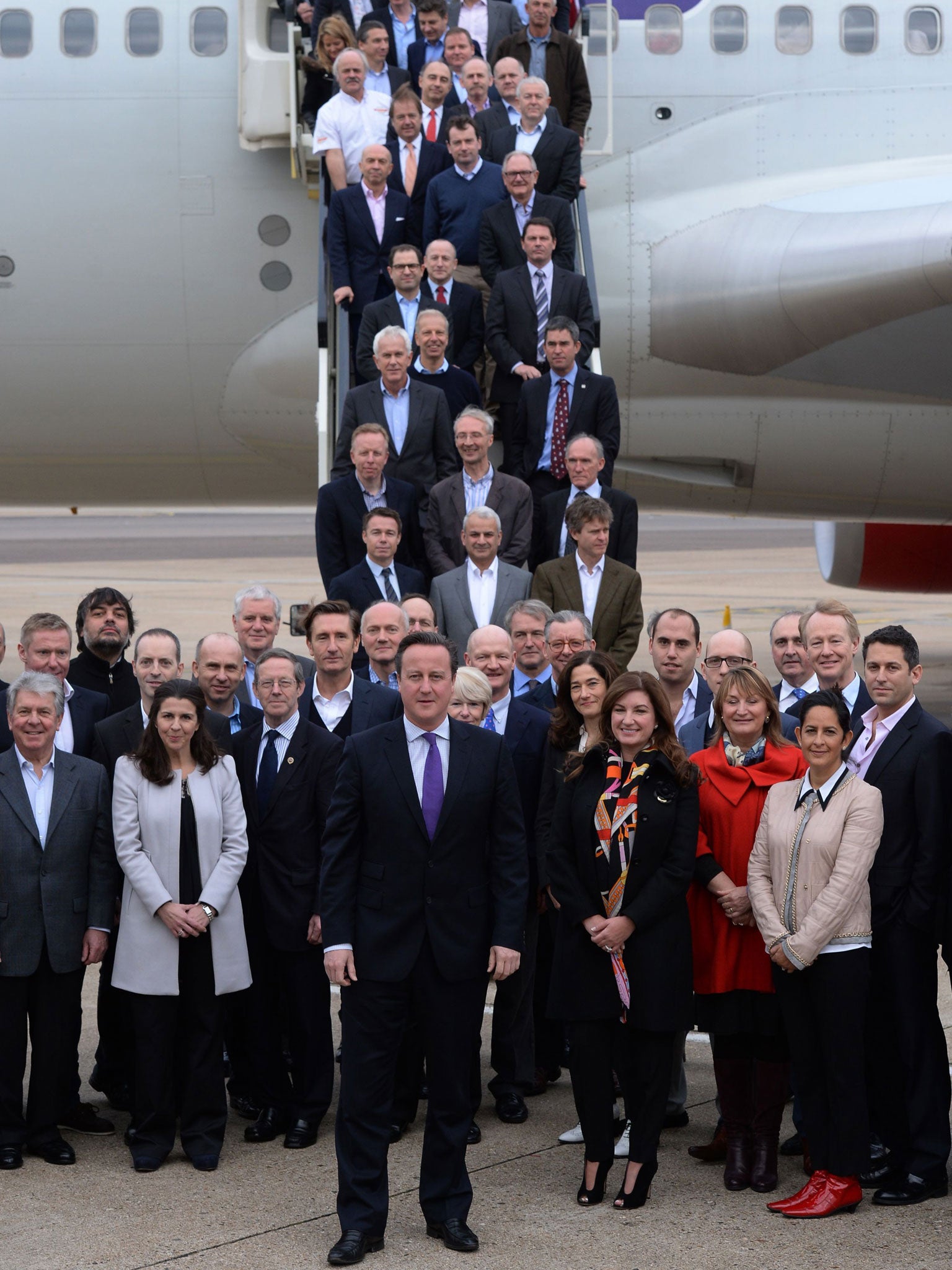The money shot: David Cameron’s Chinese entourage
Cameron’s priorities clear as stars of British business join trade mission

The last time the British Government sent such a large trade delegation to China it was so unsuccessful it eventually led to war.
David Cameron will be hoping that his visit to Beijing starting today – with more than 100 British businessmen and women eager to tap into the world’s fastest growing economy – will be a little more auspicious.
The companies represented reads like a Who’s Who of successful UK industry: Rolls-Royce, Standard Chartered, BP and Glaxo (not to mention the original driving force behind Big Brother, Sir Peter Bazalgette). It being Mr Cameron there are also some friendly faces: his father-in-law Viscount Astor (representing Silvergate Media), the big Conservative donor and lobbyist Lord Chadlington, and the Prime Minister’s former blue-skies thinker Rohan Silva all get seats on the plane.
The message is simple, if nuanced: “An open Britain is the ideal partner for an opening China.” But in some ways, little has changed since 1793 when George Macartney arrived in China on board the 64-gun man-of-war HMS Lion.
Then, as now, Britain wanted access to valuable Chinese markets for its traders – but found restrictions imposed by Emperor Qianlong uneconomic. Similarly, the visit was overshadowed by cultural misunderstandings. Then it was George III’s irritation at being told to “tremblingly obey and show no negligence” to the Emperor. Now it is Chinese anger at what it sees as British lecturing over human rights and Tibet.
But some things have changed utterly – not least the power dynamic. The idea of Britain using its military might to let its merchants turn the Pearl River estuary into the centre of the opium trade is simply no longer realistic.
Mr Cameron, who is due to arrive in Beijing this morning, knows that his delegation is very much coming as the supplicant to the Chinese Government. He had wanted to visit last year – but miscalculated the intense Chinese anger at a meeting he had held with the Dalai Lama in London. Since then British diplomats have been mending fences and going on a charm offensive.
Mr Cameron’s visit is the culmination of a long line of ministers – including Chancellor George Osborne, Transport Secretary Patrick McLoughlin, Business Minister Michael Fallon and Energy Secretary Ed Davey – making the trip to sell the UK to the People’s Republic.
As well as enjoying two state banquets with President Xi Jinping and Premier Li Keqiang, Mr Cameron will visit Shanghai to carry out a number of engagements designed to help UK companies expand in China and encourage inward investment in Britain.
One of the main aims of the trip is to signal strong British support for an EU-China free trade deal which, it is claimed, could be worth up to £1.8bn to the UK economy. In an article for the Chinese business weekly Caixin, the Prime Minister said such an agreement was potentially as important as an EU-US trade deal.
“Britain is uniquely placed to make the case for deepening the European Union’s trade and investment relationship with China,” he wrote. “I will put my full political weight behind such a deal.”
The Prime Minister’s visit will begin with a visit to Jaguar Land Rover’s training academy in Beijing, as the company signs a new agreement to supply 100,000 cars to its national sales company in China over the next year. The company estimates that Chinese sales support 38,000 jobs.
He will be accompanied on the trip by three Cabinet ministers: Health Secretary Jeremy Hunt, Culture Secretary Maria Miller and Environment Secretary Owen Paterson. Health is seen as a key area where British expertise and companies could win contracts.
Chinese government spending on medical services accounts for only 2.7 per cent of GDP, compared with 8.4 per cent in the UK, and Beijing has made increasing health spending a priority.
Subscribe to Independent Premium to bookmark this article
Want to bookmark your favourite articles and stories to read or reference later? Start your Independent Premium subscription today.

Join our commenting forum
Join thought-provoking conversations, follow other Independent readers and see their replies